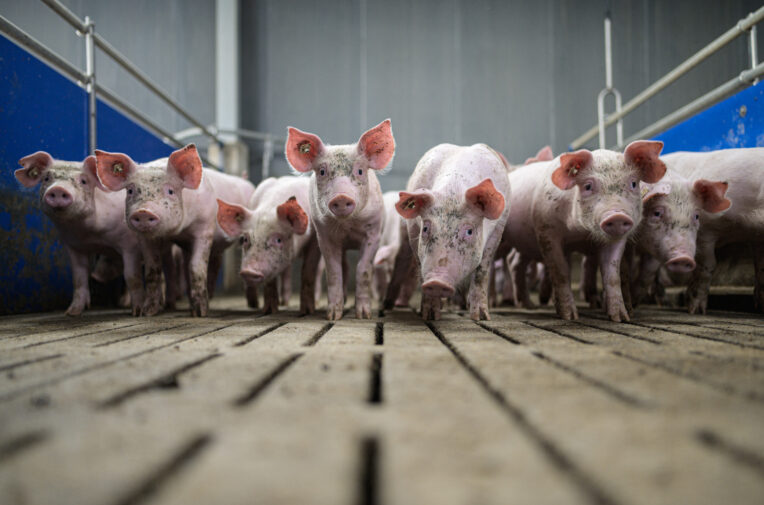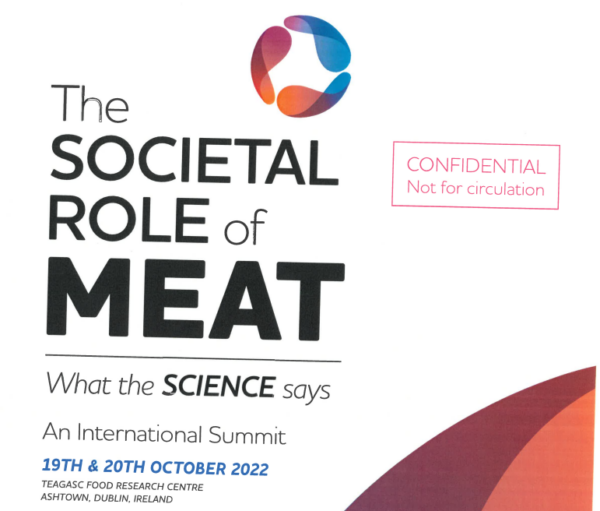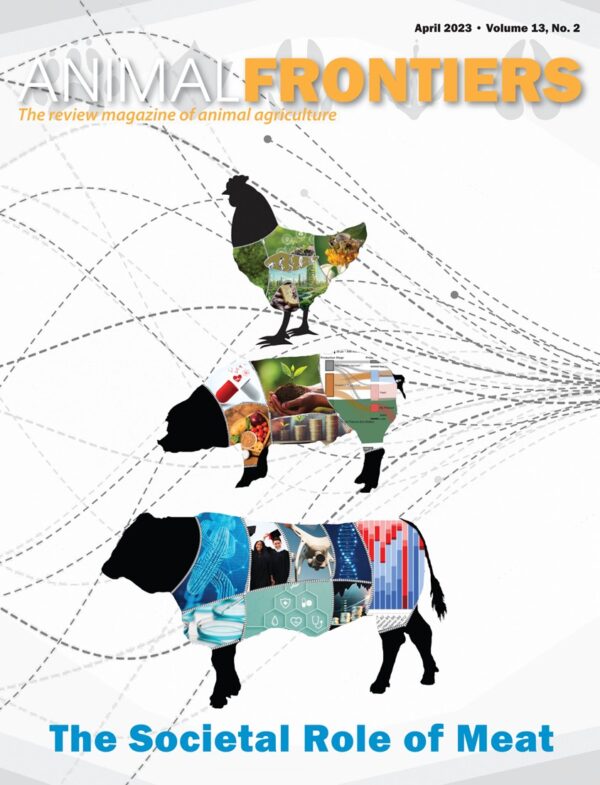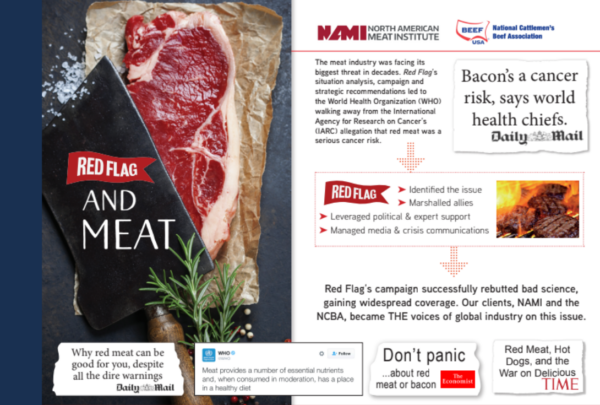
Piglets stand in a stall at a pig farm near Kempen, Germany. Photo: Lukas Schulze, Getty Images
Revealed: The livestock consultants behind the Dublin Declaration of Scientists
The document, which describes efforts to reduce meat eating as ‘zealotry,’ is being used to push back against the EU’s green deal and beating cancer plan
Revealed: The livestock consultants behind the Dublin Declaration of Scientists
The document, which describes efforts to reduce meat eating as ‘zealotry,’ is being used to push back against the EU’s green deal and beating cancer plan
Piglets stand in a stall at a pig farm near Kempen, Germany. Photo: Lukas Schulze, Getty Images
Leading European agribusiness groups are using a pro-meat manifesto called the Dublin Declaration to lobby senior EU officials against recommendations for reduced meat consumption in the bloc’s cancer strategy and sustainability policies.
But the document, which presents itself as a “declaration of scientists”, was written by people with “close ties” to the livestock industry, documents obtained by Unearthed reveal.
The Dublin Declaration of Scientists on the Societal Role of Livestock, launched at the Irish government agricultural agency Teagasc in October last year, is a short document that argues for the nutritional, environmental and social benefits of meat-eating.
It says that livestock is “too precious to society to become the victim of simplification, reductionism or zealotry”.
It has been signed by over 1,000 scientists, and was covered by newspapers including the Telegraph and the New York Post, which headlined its piece: “Scientists blast ‘zealots’ pushing plant-based diets”.
But hundreds of pages of emails, meeting minutes and other documents obtained through freedom of information requests reveal that the Declaration was written, released and promoted by agribusiness consultants, and has been used by trade groups and lobbyists to oppose green policies in Europe.
Meat-eating and the role of livestock in driving climate change are the subject of fierce debate. Recent years have seen a growing body of evidence on the greenhouse gas emissions of livestock, with eminent institutions including the UN’s Intergovernmental Panel on Climate Change (IPCC) highlighting the environmental benefits of a shift to more plant-based diets.
“We don’t want to tell people what to eat,” IPCC adaptation working group co-chair Professor Hans-Otto Pörtner said in 2019.
“But it would indeed be beneficial, for both climate and human health, if people in many rich countries consumed less meat, and if politics would create appropriate incentives to that effect.”
Spurred on by these findings, the EU has been considering a suite of laws aimed at reducing meat consumption as part of its Green Deal package. But these measures are encountering stiff resistance, and groups funded by the meat industry have used the Declaration to lobby EU politicians.
At the World Meat Congress, held in the Netherlands earlier this month, one of the Dublin Declaration’s authors, Professor Peer Ederer, told an audience of livestock industry leaders to “aggressively” use “scientific instruments” such as those associated with the Dublin Declaration to lobby policymakers.
He said: “I think the private sector needs to raise its voice to the politicians and the policymakers more directly in their respective national constituencies.”
Professor Erik Mathijs, who chaired the EU Commission’s scientific working group on sustainable food systems, told Unearthed: “Besides a jab at anti-meat ‘zealotry’, what’s in the Dublin Declaration is actually fairly uncontroversial… One can and should recognise the good qualities of animal food products, including their social, historical and cultural value.
“That recognition, however, does not contradict the scientific imperative that the world – especially those in developed economies like the EU – must reduce its consumption and production of these carbon-intensive foods that are driving land use change and pose some health risks.”
He added: “It’s important to stress that less meat does not mean no meat.”
Dr Matthew Hayek, an assistant professor in environmental studies at New York University, told Unearthed: “The Declaration is a hugely misleading endeavour. It is authored by industry-funded scientists, [and] fosters confusion and doubt when there should be none.”
The Dublin Declaration’s organising committee told Unearthed in a statement: “We categorically deny that the manifold relationships to private or public organisations which we are maintaining, are affecting the objectivity of our scientific research and the scientific evidence which we create.”
The agribusiness consultant
The Dublin Declaration was launched following a conference held by Irish agricultural agency Teagasc in October 2022, which featured presentations to an audience of nearly 200 by its lead authors — including Peer Ederer, an economist who runs a consultancy for the food and agribusiness sector.
Ederer, who is described by a member of the organising committee in an email as the Declaration’s “primary author” , is a former McKinsey consultant who works closely with agribusiness and whose clients have included McDonalds, US meat producer Smithfield, and soya giant Bunge. Ederer told Unearthed the Declaration has no lead author, and that the rest of the six person organising committee are “equal cocreators”.
Today at the World Meat Congress in Maastricht I talked about the meat industry not winning its strategic must win battles, and therefore more effort is required to make the case to society on the superior nutritional, ecological, economic and ethical performance of livestock… pic.twitter.com/hMS2RT1y0w
— Peer Ederer (@ederer_peer) October 11, 2023
In 2020 Ederer gave a talk to the Global Warming Policy Foundation, the UK’s principal climate science denial group, titled ‘Why cows are not responsible for man-made climate change’. He told the group that while he is not a scientist, he is “trained to read scientific papers”.
Ederer told Unearthed his research suggests “we will need to increase global meat production in order to provide sufficient nutrition to 10 billion people and without ruining the planet in the process.” On Twitter, he has described veganism as an “eating disorder requiring psychological treatment”.
The content of the Dublin Declaration of Scientists far less incendiary than Ederer’s personal statements. It calls for a balanced debate on livestock, based on science and recognising the nutritional and environmental benefits, as well as the cultural significance, of meat and dairy. This is what 1,166 scientists have endorsed.
The “original DNA” of the Dublin Declaration, he wrote to a group of contributing authors ahead of last year’s launch, can be traced back to a two-page position paper from a 2021 UN food summit. There, he represented the World Farmers’ Organisation, a Rome-based group that represents agricultural trade bodies worldwide, and acted as a “focal point” for negotiations in the group looking into sustainable livestock production. He told Unearthed he was not paid for representing the World Farmers Organisation.
The Declaration owes nearly 200 of its 700 words to a paper produced for the summit, written by a coalition of groups including livestock industry associations such as the International Meat Secretariat and delegates from meat-producing countries Brazil and Argentina, that called for increased meat production. Ederer told Unearthed the livestock industry’s involvement in the creation of the paper was “completely negligible”.
But the Dublin Declaration does not make its this link to industry clear. Ederer wrote in emails to his co-authors: “We have called it so far always the Dublin Declaration of Scientists because we wanted to highlight that it is a scientist’s voice.”
The rationale for the Declaration, he explained, was “to counter a tendency among a small but vocal group of scientists who believe that livestock must be dramatically reduced in both presence and in nutrition, and who pretend to be speaking on behalf of all scientists.”
“The Dublin Declaration is another instance of the livestock industry taking a page out of the fossil fuel playbook to fight action on climate change,” said Professor Jennifer Jacquet of the University of Miami.
She added: “Similar to the Oregon Petition in the 1990s and the more recent CLINTEL ‘World Climate Declaration’ to challenge the scientific consensus on man-made climate change, the Dublin Declaration tries to leverage the academic profession and its institutions to downplay the role of livestock in climate change.”

‘Close ties’ to industry
Other members of the Declaration’s organising committee also have “close ties” to industry, a member of the committee wrote in internal memos.
Declan Troy, assistant director of research at Teagasc, the Irish agricultural agency that hosted the project’s launch, compiled a list of possible links the organising committee had to the livestock industry, in response to criticism from the Irish politician Neasa Hourigan.
He listed Dr Collette Kaster, chief executive of the American Meat Science Association (AMSA), which is funded by major meat producers such as Cargill, Smithfield and Tyson, as having “close ties”. He also included Dr Mohammad Koohmairaie, head of the meat division at food research company IEH Laboratories, who has clients from “various companies including those from the meat sector”.
Troy wrote that Ederer has “possible research / consultancy funding from industry” while fellow author, Professor Frédéric Leroy, receives “possible research funding from industry”.
Leroy is a food science academic at Vrije Universiteit Brussels, president of the Belgian Association for Meat Science and Technology, and a regular presence on the meat industry conference circuit. He is also the author of Aleph 2020, an academic-led initiative in support of meat production.
The Declaration’s organising committee also includes Dr Rod Polkinghorne, a self-described “pioneer of the Australian feedlot industry” who works with meat industry actors – such as the Australian Meat Processor Corporation and Meat & Livestock Australia – through his consultancy, Birkenwood International.
In an interview with Unearthed at the World Meat Congress, Ederer acknowledged that he has “commercial customers” in the livestock sectorbut insisted no company told him or members of the organising committee to launch the initiative, or paid for their work on it. “We are very, very fiercely watchful of our intellectual independence,” he added.
When pressed on whether his meat industry clients represent a potential conflict of interest, Ederer argued that “everything is a possible conflict of interest”, and that “there is no such thing as ‘conflict of interest free’ research”.
Speaking on behalf of the organising committee, Ederer told Unearthed: “Each of us is adamant that we do not cross the line into becoming lobbyists for any particular cause. Our aim as scientists is to provide scientific evidence to the policy making process, and to general society at large.”
After Ederer was contacted by Unearthed and the Guardian, the Dublin Declaration website added a page disclosing the commercial interests of members of the organising committee. He said: “Your questions alerted us to the fact that the authorship to the Dublin Declaration was not clearly spelled out on the website, and that we had not reported about our potential conflicts of interest as would be common in scientific practice.”

Animal frontiers
In April, the Dublin Declaration was the centrepiece of an edition of the peer-reviewed journal Animal Frontiers, headlined, The Societal Role of Meat. This included papers by Ederer and some of the Declaration’s co-authors and signatories on topics including the nutritional value of meat, the ethics of meat consumption, and affordability of meat in the Global South.
A letter from the Declaration’s authors also appeared in the prestigious journal Nature Food. In a published response to the letter, a group of sixteen scientists from Sweden, Finland and the UK complained that it “contains unsubstantiated generalizations and statements that go beyond the focus of the Declaration, particularly regarding the expansion of livestock production”.
The Animal Frontiers edition is described by Ederer as the scientific underpinning of the Dublin Declaration. At the World Meat Congress, Ederer listed the Animal Frontiers papers alongside the Dublin Declaration as “scientific instruments” to be used in the advocacy of pro-livestock policies.
Professor Peter Smith, a climate scientist at the University of Aberdeen and a lead author for the IPCC, said: “The Dublin Declaration reads more like livestock industry propaganda than science, so I am not surprised by the findings that this article, and the journal it was published in, are promoting vested interests.”
He added: “There is no place in science for journals that promote the interests of the industries that fund them. It makes a mockery of independent, objective science publishing…. This is not about stifling debate – it is about protecting scientific integrity”.
Matthew Hayek, of New York University, told Unearthed: “The scientific consensus is that we need rapid meat reduction in the regions that can afford that choice. Consensus can and should always be challenged, but doing so requires strong, novel, and large amounts of high-quality evidence. The Animal Frontiers issue does not accomplish that.”
He was critical of many of the journal’s articles. “Within them, self-citing is common,” he said, “creating a distorted game of telephone with long, shaky walks back to any real primary evidence that justify its claims that high meat consumption is sustainable.”
The Animal Frontiers management board told Unearthed: “Animal Frontiers publishes discussion and position papers that present several international perspectives on the status of high-impact, global issues in animal agriculture… Animal Frontiers is funded by the scientific societies.”
“Targeting the Brussels bubble”
The Declaration’s launch in Dublin was hosted by the Irish agricultural agency Teagasc. The agency, which receives 75% of its funding from the Irish and EU governments, helped pay for the event, contributing €39,000 of the event’s €45,000 cost, mainly in the form of travel, accommodation and support for speakers, the documents show.
A networking event at the conference was sponsored by two industry groups: The American Meat Science Association (AMSA) and the North American Meat Institute (NAMI).
Professor Hannah Daly, of University College Cork, told Unearthed: “Teagasc is lending its funding and credibility to a campaign that is undermining efforts to tackle climate change. Ireland has the second highest emissions-per-capita in Europe, driven in large part by our export-oriented agriculture model based on beef and dairy products.”
A spokesperson for Teagasc said: “Teagasc routinely hosts international scientific conferences to bring together the latest science available on a particular topic, and to facilitate discussion around the science… it was left to individual scientists to decide if they wanted to sign it or not.”
The Declaration’s organisers initially focused closely on influencing European politicians. Mairead McGuiness, the EU financial services commissioner, spoke at the Dublin event, while Janusz Wojciechowski, EU agriculture commissioner, endorsed the Declaration on Twitter as a “very valuable contribution”.
Ederer wrote to his colleagues afterwards that the support of politicians is vital to the project’s success: “We need high ranking politicians at these launch events. What started the coverage in Ireland is not the brilliance of our science but the fact that we had a minister and a commissioner there.”
For a Brussels event in April, timed to coincide with the Animal Frontiers edition, Leroy emailed: “we’re specifically targeting the Brussels EU bubble”, and the organising committee discussed inviting senior officials from the agricultural, climate, environmental and health directorates. A member of Wojciechowski’s team attended.
The Brussels event was jointly hosted by the Belgian Association for Meat Science and Technology, whose president is the declaration’s co-author Frederic Leroy, and the Animal Task Force (ATF). This group partners with major European agribusiness trade groups including Copa Cogeca, the meat processors’ group Clitravi, the European Livestock and Meat Trades Union, and poultry association AVEC, alongside universities and research bodies.
The task force’s vice-president praised Leroy for involving it, noting that it would give the declaration credibility with policy makers as a “scientific initiative”, adding: “even if ATF is also the private sector ;)”.
The ATF’s vice-president told Unearthed: “While not the author, ATF supported the dissemination of the Dublin Declaration of Scientists in Brussels, as already done in the past with other scientific documents. ATF was not involved in any other issue of the scientific journal Animal Frontiers.”
Unearthed made repeated efforts to contact Leroy.
Beating cancer
The Declaration has been used by agribusiness groups to lobby senior EU politicians, particularly Wojciechowski, the agriculture commissioner.
In November 2022, the EU’s leading agri-food groups wrote to Wojciechowski using the Dublin Declaration to argue against a plan to end public funding for the promotion of red and processed meats. The bloc spent €252m (£220m) over five years advertising meat and dairy products, including €3.6m (£3.1m) on a campaign urging the public to ‘Become a Beefatarian’ in 2020.
The proposal to stop funding publicity for red and processed meat is part of the Beating Cancer Plan, a political commitment to ‘turn the tide’ on cancer, including preventative measures such as a shift to more plant-based diets.
The trade associations drew the commissioner’s attention to the Dublin Declaration, writing: “This declaration clearly shows how important it is to listen to the whole scientific community and that policy directions cannot be based on a single study as is the European Beating Cancer Plan.”
Dr Kurt Straif, who ran the programme for identifying cancer risk for the World Health Organisation’s cancer research body, the IARC, when it conducted a major evaluation on the subject, told Unearthed his team had concluded “with confidence” that processed meat is carcinogenic and red meat is “probably carcinogenic”.
He said: “Efforts to obscure or downplay the cancer risk of meat products could have a deleterious effect on the public’s awareness of such risks and may even harm the public’s health.”
The European meat processors association Clitravi told Unearthed it was “not part of the process and neither funded, worked on or signed the Declaration itself”. The group’s deputy secretary said it “considers the Declaration as the voice of many scientists around the world who are working to guarantee a safe operative space to sustainable livestock and, in general, to a sustainable agriculture and agri-food production. It is always easy to blame one sector and to not propose any solution. Many of the scientists who signed the declaration are working to propose concrete solutions”.
A meeting in Warsaw
In January 2023, a delegation for the Declaration travelled to Warsaw to present their findings at an event organised by the Polish Beef Association and attended by Wojciechowski, the agriculture commissioner.
Jerzy Wierzbicki, head of the Polish Beef Association, told the Dublin Declaration team the commissioner should be “seeking as much scientific support to help him push back against the anti meat green deal and various EU plans to reduce livestock numbers,” according to meeting minutes.
Ederer told Unearthed: “We talked with a few members of the cabinet team of the Commissioner in the break time. We did not have direct interaction with the Commissioner himself.”
Afterwards, Ederer wrote to his colleagues that Wojciechowski’s senior staff told him “the Dublin Summit and the Dublin Declaration was the first piece of utilizable science they have received in all their four years of Commission work”.
He continued: “They are more than enthusiastic about our clarity and depth of scientific evidence and relevance that we pulled together. They will support us with any other event we want to organize, especially if we do something in Brussels. Feels good to receive this feedback. We are on the right track.”
Wierzbicki denied that he or the Polish Beef Association played any role in the Dublin Declaration and that he was “aiming only to provide the Commissioner with a comprehensive understanding of the situation”. He added: “I support the Declaration because I am convinced that it presents objective scientific studies about the role of animals in sustainable agriculture and the role of beef in a sustainable, responsible diet.”
Unearthed has also learned that industry groups including Clitravi used the declaration to lobby the EU Commission’s scientific advisers to weaken recommendations in its upcoming report on sustainable food.
A summary of the meeting published by the Commission reported that participants “noted” the Declaration had not been mentioned in the scientific advisors’ presentation. In response, “The advisors confirmed that they are aware of the declaration, and that the available evidence had been very carefully analysed by many different topic experts, allowing the Opinion to provide a highly reliable and balanced view, in line with the Dublin declaration.”
The EU’s sustainable food systems law, previously touted as a “flagship initiative” of the farm to fork strategy, was dropped by the European Commission earlier this month.
Olga Kikou, head of the EU office at Compassion in World Farming, told Unearthed: “The Commission seems to have undertaken a U-turn in its promised reform of the EU agriculture policy.”
The proposals on ending the promotion of meat were “nowhere to be seen” in the Commission’s recent work despite extensive consultations, she said.
Kikou added: “It is clear that more transparency is needed on the interactions between politicians, their political groups and big industrial players, and how lobby tools such as the Dublin Declaration are used to justify the influence of vested interests.”

Red Flag
After the Declaration’s launch, it was promoted by PR agencies that specialise in working with the meat industry. The Global Meat Alliance (GMA), a British-Australian consultancy that partners with trade associations including the British Meat Processors Association and Meat and Livestock Australia, as well as JBS-owned Pilgrims, helped push the project online. “Dublin Declaration work will be continued” at COP28, the GMA wrote in a recent briefing.
But the lead promotional role was played by Irish agency Red Flag, whose clients include the North American Meat Institute (NAMI). For the Dublin Declaration, Red Flag prepared press releases and developed promotional strategies, emails show.
Ederer confirmed Red Flag’s involvement but said neither the Dublin Declaration team nor Teagasc paid for its services. ”It’s possible that somebody in the background did this,” he said, “I have no knowledge about this.”
Red Flag has previous experience in pushing back on science that threatens the meat industry: marketing materials obtained by Unearthed detail how it acted on behalf of NAMI and the National Cattlemen’s Beef Association in attacking the World Health Organisation’s cancer arm IARC after it concluded red and processed meat were ‘probably carcinogenic’.
“The meat industry was facing its biggest threat in decades,” a leaflet touting its work begins, “Red Flag’s situation analysis, campaign and strategic recommendations led to the World Health Organization (WHO) walking away from the International Agency for Research on Cancer’s (IARC) allegation that red meat was a serious cancer risk.”
The Global Meat Alliance’s CEO told Unearthed that while the firm communicates relevant information about the meat industry, including reporting and supporting the Dublin Declaration, it is not a dedicated public relations arm for the Dublin Declaration.
Unearthed made repeated efforts to contact Red Flag.
Coming to America
A year on from its launch, the Declaration played a starring role this month at the World Meat Congress, held in Maastricht, the Netherlands. Leaders from the global livestock industry were greeted by a stand promoting the project as they entered the conference hall, and Ederer’s presentation was attended by roughly 200 delegates.
His next step, he announced, was taking the Declaration beyond Europe, with a Dublin-style summit in Colorado next October.
“We’re not winning the key battles as an industry,” Ederer told the audience, “And if we’re not winning those battles, then that means they will come back to haunt us in terms of either supply restrictions, or demand influences that will hollow out the foundations of our industry.”
The Declaration is, he said, a “scientific instrument” for industry to use when engaging policymakers in the battle against policies that he described as based on “voodoo”.
“Actively involve your members of parliament, actively involve the ministries, and use aggressively those scientific instruments that we’re providing you with,” he urged the audience. “Keep on saying ‘what is the scientific evidence’ and hold those policymakers accountable to be basing their policy on scientific evidence.
“Just keep repeating ‘scientific evidence’.”

